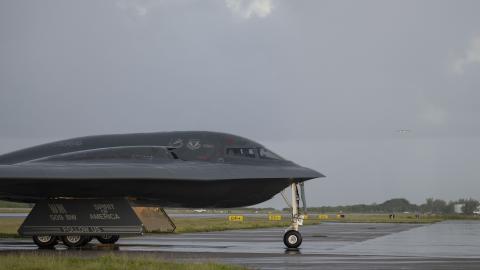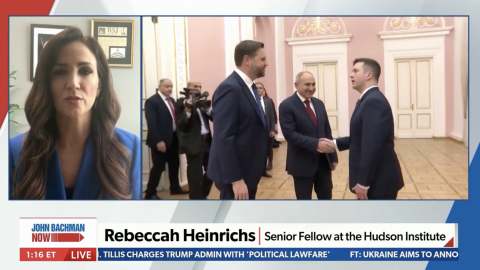
Next Steps in US-China Great Power Competition with the House Republican Policy Committee
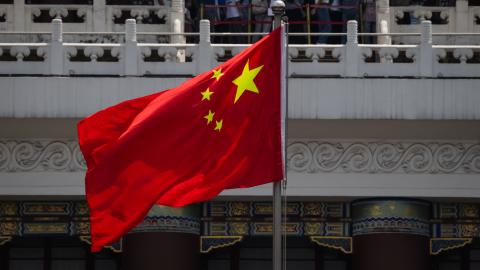
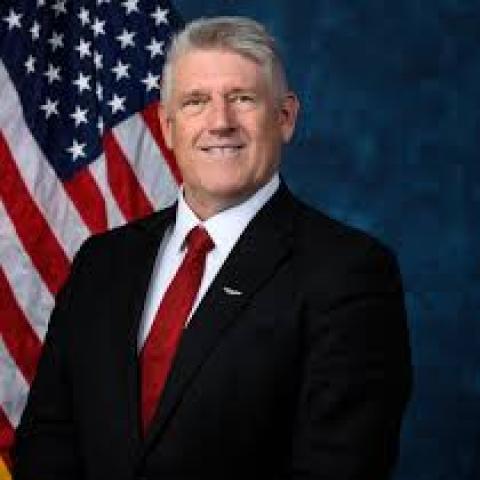
United States Representative, Second District of Montana

United States Representative, Second District of South Carolina

As the Trump administration and 119th Congress recalibrate the United States’ foreign policy and national security approach, they need to maintain strategic clarity about the danger that an unchecked Chinese Communist Party would pose to US global leadership and the American homeland. From critical supply chains and artificial intelligence to nuclear deterrence, competition with China has developed into a new cold war. Amid this great power competition, policymakers in Washington have a heightened responsibility to ensure US grand strategy protects American interests against the CCP’s efforts to reshape the foundations of international relations to suit its authoritarian and autocratic vision.
Join Hudson Senior Fellow Michael Sobolik for a panel discussion with key members of the House Republican Policy Committee. They will explore the full-spectrum competition between the US and China and identify how policymakers can sustain the strategic foundations necessary for American security and prosperity for this century and beyond.
Event Transcript
This transcription is automatically generated and edited lightly for accuracy. Please excuse any errors.
Michael Sobolik:
Good afternoon. Welcome to the Hudson Institute, thank you for joining us today. My name is Michael Sobolik. I’m a Senior Fellow here at Hudson, and I’m glad to be with you for this important conversation with distinguished members of the US House of Representatives.
We’re gathered together today for this event, Next Steps in US-China Great Power Competition with the House Republican Policy Committee. And we have with us who will be joining us in just a moment Representative Joe Wilson from South Carolina’s Second Congressional District, which my wife is from North Carolina, but today and only today will I say that South Carolina is the superior of our two Carolinas, and also Representative Troy Downing from the Second Congressional District of Montana.
When the Republican Policy Committee staff reached out to Hudson and inquired about partnering for this event, I did a little bit of digging into RPC’s history, and we’re talking today about what many are calling this new Cold War that the United States has locked in with the Chinese Communist Party, the Republican Policy Committee was founded in 1949 in the early years of America’s first Cold War, then with the Soviet Union. It remains central in the House’s efforts to win that conflict with the Soviet Union. RPC raised concerns about America’s capability shortfalls in the military domain, it worked to shine a light on Soviet malign influence within the United States, and it supported Reagan’s Peace Through Strength foreign policy that ultimately brought the first Cold War to a favorable conclusion.
Now today, as the United States faces another dangerous adversary, the Chinese Communist Party, American needs that same clarity of vision and resolve that institutions like the RPC have brought consistently. RPC is vital not just for the strategic value, but it also serves a core legislative function within Congress, it helps the body fulfill its Article I constitutional role. Of course, the president has the energy in our system as the primary foreign policy leader and actor in the United States, but Congress also has a vital role to play. And I’m not just saying that as a former Senate staffer, it’s true, it really is. From oversight and legislating to controlling and calibrating the purse strings of government, Capitol Hill has always been vital to shape a thoughtful and consistent and strategic foreign policy that maximizes American power and defends our liberty.
So we have a lot of ground to cover today, thanks in large part to the Chinese Communist Party and their multi-front political warfare campaign that they’re waging against Americans. You can look at fentanyl, you can look at TikTok, you can look at their hammerlock on rare-earth mineral supply chains. Beijing is coming at the United States in multiple sectors and multiple domains to weaken America, to kill Americans, and to starve our economy of precious commodities, ultimately to hollow out our competitiveness. And Xi Jinping is doing this because the United States stands in his path toward rejuvenating the Chinese nation, most notably by subsuming Taiwan. So America has a lot of work ahead of us to secure freedom, and we clearly have a lot of work to get into today in this conversation. So with that, please join me in welcoming two members of Congress to the stage for this conversation, Representative Wilson and Representative Downing.
Representative Troy Downing:
Thank you.
Representative Joe Wilson:
Thank you.
Representative Troy Downing:
My honor, to be with you, thank you.
Michael Sobolik:
Thank you so much. Representative Wilson, start the conversation with you. Welcome back to Hudson. You were here not that long ago. It’s always great to have you, sir.
Representative Joe Wilson:
Well, hey, I appreciate Hudson, and I also appreciate that our former governor, Governor Nikki Randhawa Haley now is associated with Hudson. And I express sympathy, her mother passed away last week, but what a superstar. She was the second Indian-American governor in the United States and the first female governor in South Carolina in 340 years. So you really picked up a superstar with Nikki Haley.
Michael Sobolik:
We did indeed, thank you. Those are very kind words and we share all of those condolences as well.
We talk a lot about America again in this new conflict that some call a new Cold War, some call political warfare, others describe it, Great Power competition. The prior administration talked about Managed Competition. There are a lot of nouns and a lot of different adjectives that we use in Washington when we talk about our relationship with China. But what I want to start this conversation by asking you, put aside the grammar, put aside the niceties, what is the objective that we are competing for? What should be our objective with the Chinese Communist Party? Is it winning? Is it détente? If it’s winning, what does that look like? If we could start the conversation by being a little more specific about the end state that we’re all working towards with China.
Representative Joe Wilson:
Well, Michael, my view, again, I’m just very grateful to be serving. I’m still an unreconstructed cold warrior, and that is, I campaigned, seeing all the young people here, I campaigned for Barry Goldwater to win our victory over communism. And at that time, it was immediately dismissed by the mainstream media as being a warmonger. Well, no, actually out of that campaign came this guy called Ronald Reagan, and we had victory over communism and freedom for dozens of countries that were slave states for decades, and now they’re free.
And so when I see where we are today, I believe we’re in a conflict we did not choose, and it’s dictatorships with rule of gun invading democracies with rule of law. And it began on February 24th, 2022 with the invasion by war criminal Putin of Ukraine. And then October 7th, 2024 along came the invasion by, I consider, the regime in Tehran. I don’t blame the people of Iran, it’s the regime in Tehran invading Israel. But the good news is that the people of Ukraine have stood up, the people of Israel have stood up, and what a message this is to the other dictatorship, and that is the Xi dictatorship of Beijing. And so that’s where I believe that we are today, and we need to be working together with our allies to make sure that... And I think we’ve made remarkable progress working together to face the dictatorships. And so I’m very, very hopeful.
Michael Sobolik:
You mentioned a lot about the broader strategic landscape where it’s not just the United States and China in this duopoly of a competition, but we have a lot of other nations that are threatening our interests, our values, and, as you say, they are aligned with Beijing. And maybe in a few minutes we can circle back to Russia, Iran, and others.
Representative Downing though, before we get too far into the global picture, let’s spend a little bit of time talking about the United States. Your home state was one of the early spectators of this quite fascinating episode in China policy in 2023 where we looked up in the sky and we saw a giant spy balloon flying over the country. And in this disaggregated age that we all live in where we’re staring on our screens, it was this kind of shared American moment when we all kind of, if you were in the flight route of the balloon, you literally put your phone down and you looked up in the sky and it was there. And it was this tangible moment, tangible evidence of what the Chinese Communist Party was trying to do, not just with violating our sovereignty, but collecting information about our country. And I’m asking you this because the flight path flew over a very critical military base that I believe happens to be in your congressional district.
Representative Troy Downing:
Malmstrom, yep.
Michael Sobolik:
So could you talk to us about how you perceive that spy balloon and the lessons you took away about what China is willing to do from that?
Representative Troy Downing:
Well, first of all, and not to take too many jabs here, but I think it was an incredible failure of the previous administration to not know until that was over Montana. I mean, that had been over Alaska, it had been over United States territory for quite a while. And the only reason we know about it is there was a photographer in Billings, Montana who happened to spot it and happened to get a picture of it. I mean, none of us would probably be talking about that right now if that would not have happened. And talk about a failure in our protection systems. I mean, that demonstrates that right now.
The threats, I mean, China, they’re constantly probing the fence. What can you get away with? What can you do to get deeper and deeper and see if there’s going to be a response? And a lot of folks are saying, “Well, who cares? There’s satellites that can take picture,” but the signal intelligence picking up what’s happening and closer surveillance of that is an incredible risk to the United States. Malmstrom Air Force base, I mean, that’s part of the triad, it’s been on alert for 62 years preventing global nuclear war. That is our deterrence.
And the fact that they’re probing that fence and looking to see what’s happening there with a closer look, and not just visually, but gathering signal intelligence and everything else they’re doing, I think a couple of things, it shows how bold the Chinese would be. I mean, most nations would be a little timid about having such a direct assault on a superpower. I think that that’s a very, very bold action, and the fact that they did that shows that they’re going to continue to probe that fence. And I think we need to take that very, very seriously. And personally, I don’t know if the previous administration knew about it and didn’t tell us about it or just didn’t know about it, but either one is a bad answer, and personally, I think there should have been a strong signal when that happened of taking that thing down and making sure that there were some kind of repercussions, understanding that we’re not going to tolerate that.
Michael Sobolik:
Quick follow up question on that actually, it’s hard to talk about an Malmstrom Air Force base and our nuclear capability without commenting on what China is doing in the nuclear domain. We have been trying for decades and decades to control not just proliferation of new nuclear states, but we’ve been trying to get Russia to build down their arsenal with us, which admittedly is very difficult for a whole host of reasons, but China is not interested in having a controlled or a small nuclear arsenal at all. Recently, subsequent administrations have warned about this massive buildup of nuclear capacity in the People’s Republic of China. So maybe a quick follow up before we move on from spy balloon, the nuclear domain is emerging as an increasingly dangerous one with the US and China, what should our policymakers be thinking about with our own deterrent posture?
Representative Troy Downing:
Well, first of all, I know there’s been some sentiment on whether we really need the triad, and I am a firm believer that we do. And the way that that’s set up to make sure that it takes just such an excessive amount of force to be able to disable it, that nobody would ever even make that attempt. To your point, if they build up a stockpile to the point where there can, I think we need to figure out what we can do to curb that. But I think it’s incredibly important. People talk about what we’re doing with the air and sea-based part of the triad, and that’s great, but we need all three. And Malmstrom’s been on alert since 1962. It’s really interesting to think about that, there’s been missileers down a hundred feet underground manning that for sixty-something years, which is really incredible. And I think about those people down there spending all that time and training hoping they never have to do their job.
But what we need to understand is this is not something to assault, this is something to deter. And I really believe that the reason that we haven’t had any major events since the first one is because we have that deterrent. And it’s not just sea-based, it’s not just air-based, it’s land-based as well covering amount of area that is really, really difficult for any adversary to hit, really based on the number of weapons they have. If you got enough, that might be more of a threat. And so we need to be very focused on that and figure out what kind of diplomacy or sticks or carrots we can use to make sure that that doesn’t continue to grow because it’s not just in our interest, it’s in the global interest.
Michael Sobolik:
Representative Wilson.
Representative Joe Wilson:
I have to point out, there was a South Carolina association with the spy balloon, which actually is even more inconceivable, and that is the spy balloon really began over Guam, over Anderson Air Force Base. And I know that Congressman Jim Moylan of Guam was offended. And then it went over Montana and our colleague Russell Zinke, Congressman Zinke, Ryan Zinke was offended. But it actually landed, was shot down in front of Congressman Russell Fry’s home at Surfside Beach in South Carolina. And so the prior administration, and the Congressman’s being nice about the prior administration, but it was total utter incompetence that you would have such a spy balloon.
And I always like to point out to Congressman Zinke was counting on it being shot down over Montana, and then they would have a historic site to charge admission, okay? But I mean, how silly to allow. And indeed, going across South Carolina, it was over Shaw Air Force Base, Fort Jackson, the Army training facilities, over and over again, the incompetence. And thank goodness we have with Donald Trump a president who would not allow that to happen. I’m confident the moment it left Anderson Air Force base over the Pacific, it would be down. And so what a time in history, what a change in history, beneficial, I think, for the American people.
Representative Troy Downing:
Yeah, no, definitely. And I got to say that for the record, I volunteered to shoot it down myself, but nobody-
Representative Joe Wilson:
Hey, everybody in Montana was out there, okay?
Representative Troy Downing:
Yeah, we got plenty of dirt for it to land in, but yeah.
Representative Joe Wilson:
Historic sites.
Representative Troy Downing:
I wish they would’ve taken you up on that. But yeah, no, but it’s interesting talking about the change in administrations, and I know we’re talking about China right now, but I got to tell you the fact that we could fly a mission halfway around the world, enter into enemy airspace without being detected, without of their anti-aircraft weapons or any of their surveillance detecting, put bombs in pickle barrels get out and have the Ayatollah find out by a tweet from the president, I mean, God bless America. That shows American strength right there, and I think that is part of that path to peace through strength, showing the world what we can do.
Michael Sobolik:
This is an incredibly important point that I actually want to tug on that thread a little bit. One of the biggest reasons our B12 bombers were able to conduct a mission like that with the relative ease of Operation Midnight Hammer was because of our allies in Israel and the way that they degraded the Iranian air defenses and missile launchers. And the story behind that is insane. Pre-positioned Israeli assets, drones and payloads were in Iranian territory, and then they activated them inside of Iranian sovereign territory and took out those assets. And obviously the aerial bombing campaign helped as well. But it was this incredible example of, number one, allies and partners being valuable, but number two, that kind of insidious sabotage is great in warfare if your friends are doing it. But the Chinese Communist Party is pre-positioning those assets all throughout America, whether it’s our solar panel components that connect our solar power to the grid, those inverters, many of them are made by China in the entire country.
You also talk about DJI drones, which are completely manufactured by China, they’re very cheap, local law enforcement loves them, but subsequent administrations have warned that it presents an espionage threat to our critical infrastructure that Beijing could leverage in a moment of crisis. So as I look at what’s happening in this incredible example of American strength in the Middle East, I also look back here to our home and see our exposure to Chinese technology, and I think what do we need to be doing to insulate ourselves to make sure they can’t exploit us?
Representative Troy Downing:
I think that’s an incredible problem. And we’re just kind of getting to the surface on this. I mean, in Montana, we have restrictions in statute on Chinese-owned property and where we’re producing food or near critical infrastructure. And I think that’s one part of it.
But the other part that you had mentioned is are we prepared for that next version of warfare? I’ve gone to war for this country, I’ve seen what it looks like in a conventional sense, and I’ve also been to the front lines in Ukraine and seen a totally different way of fighting wars. And I think about how they’re doing that with these mass-produced drones that it’s really incredible to see, you see a swarm of drones take out a Russian naval ship, you would’ve never thought that could happen. It is just crazy to watch this stuff. And I think about the traditional US 10-year, $30 billion mil-spec project for some great super weapon, but what are we doing about mass-produced? How are we going to fight that warfare?
And I look at the LIMFACs and our ability to rapidly manufacture that type of a weapon that’s not a mil-spec, that’s fast, quickly manufactured and inexpensive, relatively inexpensive. And I look at what’s happening like in Ukraine, I mean, the LIMFAC is Chinese manufacturing. So what are we doing to make sure that we can compete in that next part where the answer to every problem is not a 10 billion mil-spec 10 year project, how do we compete with mass-produced cheap stuff to counteract how warfare is changing in front of our eyes right now? And that’s something that I think about a lot. I see you anxious to answer.
Representative Joe Wilson:
Well, no, no, hey, I’m just anxious to point out that indeed our allies have done well indeed with the capabilities of Israel to preplace drones to destroy the anti-aircraft capability. But also, hey, how incredible what occurred with the people of Ukraine, they pre-positioned drones at Russian bases and destroyed 40% of the former Soviet bomber fleet. And so we’ve got to be ever vigilant, and that’s why we need good new people in Congress to be here to indeed address these issues because it is a new world. And as we’re dealing with drones, I call them 39.95 drones, and we had to send up a $2 million missile to shoot it down, we’ve got to do better than that. And I’m confident with Secretary Pete Hegseth we’ve got people in place who understand that and we will be able to address.
Representative Troy Downing:
But one thing I just want to add on kind of backing up a little bit something that you said is the story that you gave really underlines the importance of supporting our biggest ally in the Middle East and making sure that they have the support, I mean, not just for their own survival, but obviously helping us as well. So I think that gets lost in the conversation sometimes, but it’s incredibly important that we continue to support.
Michael Sobolik:
So this gets to maybe not in the whole country, but at least inside of the DC beltway, what has been a controversial question for the past few years, I suppose ever since 2022 when Russia further invaded Ukraine. And it’s this really fundamental inquiry of, is the United States strong enough to simultaneously protect our friends in Ukraine, our ally in Israel, and deter Chinese aggression either in the South China Sea or in Taiwan or in Sino-Indian border? Pick your Chinese potential flashpoint. And this debate is live not only within Congress, and you don’t need to hear that from me because you encounter it every day, but it’s live within the administration, certainly an ongoing question within Washington.
What do you say to that argument made by some who maybe put themselves in the “retrencher” camp that the United States maybe is not as strong as we were at the end of the Cold War, that our capabilities are restricted, we’re spending more on servicing the debt right now than we are on defense, maybe we have to pick and choose the crises we’re able to respond to. How do you interpret that argument and how do you respond to it?
Representative Joe Wilson:
Well, I’m really grateful. I think you’re being nice. These are isolationists, and somehow they don’t understand what a small world it is. You can have hypersonic missiles within seconds, virtually come across the Atlantic to hit the United States. But putting that in perspective, we can do all, and there’s no question that we can do all and we need to do all. But it’s not alone.
And that’s why Donald Trump has been so important, and that is that he understood that we need to have our NATO allies. Hey, the American media, God bless their heart, 93% Democrat, God bless them, anyway, they said he was against NATO, he was not against NATO, he was with the Secretary General today. And from the beginning as a member of the NATO Parliamentary Assembly and Chairman of the Helsinki Commission, I know what he wanted was NATO to come up with 2%, and now it’s up 5%. And then people say, “Well, it can’t be done,” well now, Chancellor Merz has said 5% in the country that was most concerning to all of us of not doing their part was Germany, but they are. And now all of our allies are coming up with 5%, and they’ve got countries like Lithuania and Poland 6% over and over again.
We can do all, and it’s not alone. We work with our allies and, gosh, the allies that we have of Israel, how capable we see, we don’t have to send troops there. Indeed, with the capabilities that Israel has, they can address. And then there’s a ripple effect, and it’s called the destruction of the Chinese influence in the Middle East, beginning with the Assad dictatorship last December fleeing to Moscow. And so now that the new Al-Haram government is going to be pro-American and the Chinese, Iranian and Russian influence is being removed. And hey, we’ve got a new government in Lebanon, it is exciting to see changes that are coming. And then I’m hopeful and truly believe the people of Iran understand they can do better, and I know they can do better. And with sanctions that President Trump will be placing just over and over again, and hey, we need to understand too that 90% of the Iranian oil is sold or given sweetheart deals to the Chinese Communist Party, okay?
So over and over again, there’s a ripple effect occurring, it’s called peace through strength. And thank God for Ronald Reagan, he taught us this. And so we can do all, but it’s not alone. And hey, the people of Ukraine, I was there in December before the invasion, and the whole planning was for resistance and guerrilla warfare, little did they know that they could actually stop the mighty Soviet, pardon me, Putin army successfully and still exist because, hey, Putin had told his troops to take dress uniforms so they could be prepared for the welcome parade when they get to Kiev. Well, that didn’t happen. They were welcomed, but not by flowers.
And so over and over again, our allies can make a difference. The frontline allies of Ukraine and Israel, and then the backup, the different countries. And we see success of the Abraham Accords, how incredible that is. And then the backup of Turkey assisting and also Saudi Arabia backing up the efforts in Syria. Over and over again with the leadership of Donald Trump, not the slow walking of the prior administration, we tried to be bipartisan working with them except for one thing, everything was slow walking. They didn’t want to offend Putin, and they certainly didn’t want to offend Khomeini. And so it was slow walking. And so today, and it should be bipartisan, we’re working substantially together to address all issues. And then all of it is a deterrence to the Chinese Communist Party success. And the unintended consequence that Putin has found out of Finland and Sweden being part of NATO, good gosh, that’s inconceivable, much less the 5% and so over and over again. And then to see the unintended consequence of the destruction of the nuclear capability, it has been obliterated in Iran.
Representative Troy Downing:
Just a couple of thoughts on that. I don’t disagree with my colleague that we can do a lot. I think that we need to be very selective on how we do that. I don’t think we should be involved in regime changes, but I think we should be sending messages like we just did, getting people to the table. And Iran is notorious for being really good negotiators, in other words, being able to drag something out forever until they continue doing what they were doing in the back room. And I think that what happened is going to change that.
So one of the things I want to point out that was talked about a little bit here is I grew up during the Cold War. I mean, when I was in high school or junior high, the biggest threat you thought was the Soviet Union destroying you in a nuclear war, and you always had this idea that Russia was this big powerful military, big powerful superpower. And when they invaded Ukraine, we expected that to be a three-day war and three years later, they’re now having to pay villagers to put on uniforms and go fight their war. So you see that dragging on and on.
And so that was something that underlined their lack of capability. And what we just did, what President Trump did under his Article II, Section 2 authority in sending in bombers across the country to do the story I just told you, put a bomb in a pickle barrel, that showed the rest of the world what the capabilities of the United States of America are. And I think you juxtapose those and that starts to give you the ability to support our allies, to defend against those that want to harm us in a way that is not conventionally expensive, that’s not boots on the ground, that gets people to the table that understand that they have to deal with this, they have to come to agreement with us and not play those tricks like we’ve seen under the Iranian regime of just dragging something out while you’re building nukes in the back room. So I think that there’s a lot of opportunity to not have to necessarily prioritize, but be very surgical about how you get those results that you want.
Michael Sobolik:
We’re talking a lot about warfare, and it’s difficult I think in the 21st century to have a conversation about what that looks like without a commentary on technology. For the sole reason of you being on the Financial Services Committee, Representative Downing, I’m going to start this conversation with you and then Representative Wilson, we’ll bring you in shortly. Beyond nukes, the tech competition, partially for reasons of AI, partially because of all the applications of AI with robotics, it’s going to change the medical sector, it’s going to change driving, it’s going to change manufacturing, it’s changing pretty much everything.
Representative Troy Downing:
It’ll change everything.
Michael Sobolik:
That’s right, that’s right. I know you’re focused on crypto as well, and if you want to get into that in a bit, we can. China is obviously investing a whole bunch, not just to win the technological race of the 21st century, they’re investing in a digital currency, which I know on the Financial Services Committee you’re looking into what Beijing is doing there. How do we deal in the digital domain with a high-tech Marxist-Leninist regime where it’s this old ideology that we have this familiar, and obviously CCP is not completely equivalent with the Soviet Union, and yet it’s a Marxist-Leninist regime, which is an old ideology, but they are angling to win the most cutting-edge technology in this century at American’s expense? How do you think through that problem set for the United States?
Representative Troy Downing:
Well, I mean this is a big topic. We could spend the whole day on this one topic.
Michael Sobolik:
Yes.
Representative Troy Downing:
And I think this is really our modern-day arms race or this is our modern-day race to the moon. I mean, this is the big race right now. And what is happening right now, first of all, to peel a couple, because you covered a couple of different topics there. Now, first of all, the centralized digital currency that the Chinese want completely makes sense in a Marxist-Communist authoritarian government. You want to be able to track what your people are doing. And that’s why most of the people, if not all of them on my side of the aisle, are opposed to a central bank digital currency because we don’t want to be tracked, we like to have our anonymity, our separation from government surveillance. But it completely makes sense why China would want to do that.
On the digital currency space, I think that one of the things that was really hobbling the United States of America in the last administration is under the Biden administration, Gary Gensler running the SEC, not given any clarity on how to do a digital currency offering, whether it was a security and pass the Howey Test, whether it was a commodity, how you dealt with that. And it just completely created this chaos in the system where nobody really knew how to build something within the confines. I mean, really, they did regulation through enforcement. They would not give you the rules, they would just come after you if they didn’t like what you did, and it completely disabled or created a dysfunctional environment in the United States of America. And that’s why you saw innovation not happening in the United States, you saw some of this stuff happening offshore, like the elephant in the room was FTX and Sam Bankman-Fried did that in The Bahamas, and obviously that was one of the biggest failures that we’ve seen in recent history. So having a framework so that we can continue to innovate in the United States of America.
The other part is on the artificial intelligence side, that is a huge race and that has so many national security implications, economic implications. So just the way we do business, everything’s going to change. Even talking about drone warfare, when we’re talking about what’s going on in Ukraine, I mean, right now if you’re using radio frequency, you can jam that signal, you can detect that signal. If you’re using light, you can do that. If you’re using AI that can just figure out what it wants to do, I mean, how do you stop that? That’s a whole other issue. There’s so many parts on what’s happening in AI. And we need to make sure that the United States of America continues to be the innovator, continues to attract innovation here in that we are as broad as we can in not regulating it to a point where you can’t get anything done and you’re incentivizing to do it elsewhere, but figure out what those reasonable sideboards are so you don’t have another FTX.
But one of the things that scares me most in that is we need to figure out how we’re going to power it. We need to figure out how we’re going to generate the power to run the distributed ledgers, the blockchain, the digital currencies, the crypto, the artificial intelligence, all of this. It’s going to require incredible data centers that have an incredible need for power. And everybody’s talking about generation, and I’ll tell you, I’m a big fan of Chris Wright, the Secretary of Energy. He’s a personal friend. I think he’s dialed into what we need to do on the generation side.
End of the day though, you can’t build a data center always next to the point of generation. We need to start building our distribution. We don’t have the distribution to deal with it if we did have the power to do it. So we really need to start focusing on how we’re generating and how we’re transmitting so that we can be in that race because the Chinese, they’re not going to put any roadblocks, they’re not going to have any regulatory issues, any environmental impact. They’re just going to start building coal-powered power plants like crazy.
Michael Sobolik:
They’re doing that, that’s right, that’s right.
Representative Troy Downing:
So that they can generate the power that they need to not keep up with us, but to blow us out of the water. And so we need to really start thinking about regulatory reform so it doesn’t take you so long to bring in that new power plant, to put in that new transmission line, to upgrade our system so that we can be competitive. Because if not, I think it’s not just an economic threat, I think it’s a national security threat to allow them to win in what I see right now is the modern-day space race or our arms race.
And it concerns me a lot, and it’s something I’ve been focusing on, at least in Montana. We’ve got coal-burning power plants, and I’m trying to figure out how to keep those from being shuttered, make sure we can keep pulling coal out of the ground. And not saying that there aren’t other things, I know Secretary Wright is looking at small modular nuclear. There’s lots of pieces to this puzzle, but we need to figure out how we can do it rapidly so that we can compete now. And if we don’t start doing that now, we’re not going to be competitive.
Michael Sobolik:
Representative Wilson, you’re on the Armed Services Committee, a quite senior member at that. How do you look at this tech AI angle with China?
Representative Joe Wilson:
In fact, we’re soulmates here and we also agree Secretary Wright, what a visionary he is, and that is for small modular reactors. And of course one of the manufacturing sites could be at the Savannah River site in South Carolina, the largest geographic area, 310 square miles on the East Coast which is secure. But small modular reactors can be very, very important.
And then indeed, all of this really relates to another issue, and that is that with AI or energy or whatever, we’re dealing with an enemy that is military-civilian fusion of industry. And so every company is a state-owned company. And I saw it firsthand, I was in Shanghai and visited the bio-steel plant, and when I got there, it was very impressive, a room full of different displays of different companies that had Western names in really center cool of different companies. And they said, “Hey, calm down, Congressman, these are all state-owned enterprises owned by the same Communist party,” so oh, okay. And so then when we toured, you could actually see that it had military applications that could be understood.
And we’ve got to handle sanctions, and President Trump will do that because in the last couple of years, nearly $40 billion of American investments have been made in companies that are directly related to the Chinese Communist Party military operations and apparatus. That’s just inconceivable. It’s bad enough that we even have companies that are providing technology for war criminal Putin for his jets. And then just over and over again, and we’ve had a president who’ll do it, and we’ve had a president who will deregulate. And so that’s why I’m such an optimist of what will be occurring in the future.
Michael Sobolik:
As we begin to wrap up this part of the conversation, before we bring in the audience’s questions, let’s turn our gaze back to the United States right now. We have in this digital domain not only the concerns of how do we win this high-tech race so our companies can be competitive globally and beat out Chinese companies, we also have this concern over the information space within the United States. And I recall last year, and I suppose even the year before that, the topic du jour of US-China tech competition within our homeland has been TikTok. And the Congress last year passed by congressional standards incredibly quickly legislation that would require TikTok to divest from its Chinese parent company, Supreme Court unanimously upheld it. The enforcement of that law has been delayed repeatedly this year. Would love to hear how you view the best way to make sure that the American people are not exposed to the whims of an adversary where it’s essentially the equivalent of the Soviet Union owning ABC or CBS during the prior Cold War. Where do you guys think TikTok is going?
Representative Joe Wilson:
Well, I really am concerned because it is inconceivable a totalitarian state would have such ability to control communications within our country and to have such impact on the young people of our country. And it can be step-by-step. And we see it with the United Front, which is the division of the Chinese Communist Party, which Mao Zedong has said it’s his secret weapon to destroy democracy and establish Chinese Communist world domination. And we see that over and over again. And Georgia, the Republic of Georgia, the efforts to actually take over the port there, the only Black Sea port that the Republic of Georgia has, and the Chinese Communist Party has come in and taken it. And so over and over again, we know there are efforts, as I mentioned, thank God that have been reversed in Syria, but we see their efforts. And working in some Caribbean islands of all things. And so you can see efforts made all over the world as subversion of different countries in Africa and this has just got to be addressed and we’ve got a president who’ll do it.
And Donald Trump understands that the way to do it indeed is not with conflict, but it is with sanctions, enforceable sanctions and identifying specific companies. And then the financier of the dictators of rule of gun are in Beijing, and so that’s just got to be addressed. And I’m confident Donald Trump and hey, good gosh, how fortunate we are, Marco Rubio, Secretary of State, who would imagine? You don’t have to explain to Marco Rubio the dangers of communism. The reason he’s in America is because of the dangers of communism, the conquest of Cuba. So over and over again, I’m very optimistic.
Representative Troy Downing:
There’s a couple of things that come to mind when talking about TikTok. I mean, first and foremost, I’m always concerned about where that falls in with First Amendment rights. But with TikTok in particular, here you’ve got an application owned by a foreign adversary that wants to do us harm, and I’m sure every one of your kids has a TikTok account and they are able to collect information from that. And you’ve got a foreign adversary that is getting a population of a country to voluntarily download an app so that they can get information. And that’s only part of the problem. So that information, it’s going to be huge, but in the AI race, you’ll be able to parse that data pretty quickly and start to get useful information that can be used against us.
But the other part that you mentioned is like what if a foreign adversary owns ABC? Because that’s the other thing is their ability to influence the thoughts of people on that and the way that they can use, again, AI to understand what kind of content they need to feed you to keep your eyeballs watching that. And they’re very good at it. I mean, if you would’ve told somebody 10 years ago that you’re going to sit there for four hours straight looking at videos of cats doing backflips, you’d say, “No way.” But I mean, people get sucked into this thing. And so once you’re sucked into it and you’re sending this either subliminally or straight on its face, it can start sending you messaging that can affect an entire population.
And that’s a scary place to have a foreign adversary to have that kind of power over a population where, I don’t know what the percentage of Americans are that have an account there, but I know it’s high, especially amongst younger Americans. So they’re collecting data and they’re influencing a population that may start to say silly things like we see in the conflict in the Middle East. I mean, we’ve got basically college kids cheering on terrorists. Where are they getting this information? And the ability to influence an entire generation or generation and a half of Americans to think different than reality is a powerful tool. So what is the answer to that? I think it’s something that we need to see as it is, as a threat to the United States of America and figure out what we need to do to combat that because I think very dangerous.
Michael Sobolik:
One more question, and we’ll keep it brief, we promise, before we open up to audience Q&A. We cannot, I think, have this conversation without at least addressing Taiwan. So we have the war in Eastern Europe that is raging on, we have what appears to be an incredibly successful operation in concert with the Israelis in the Middle East. How do you see the short-term and maybe if you’re willing to prognosticate the medium-term fortunes of Taiwan? How do you view maybe even beyond these next 3.5 years Taiwan’s future looking? And what can America do to make sure that it’s a good future?
Representative Troy Downing:
I think that what you’ve finished that with is the germane point, the 3.5 years. I don’t think Xi Jinping is going to do anything while Trump’s in office. And I am very confident in that. I’m not sure what administration follows Trump, but I know that.
But one of the things that I worry about is the difference between China with most of the other folks that we’re talking about is they’re running a marathon and a lot of other people are trying to run sprints. I mean, they’re looking at reunification in 50 years times, most of us are looking in four year increments. And so that’s a very different way that we have to look about it. But I don’t think that we see any threat during this administration, but I think that they’re going to keep probing the fence like they did with, they’re going to find weaknesses. They’re seeing how we react when we’re pulled into things, seeing how we react to Iran, see how we react to Ukraine. But they’re gathering information and probing the fence right now.
Representative Joe Wilson:
And I’m really hopeful, and I agree, it’s really peace through strength. As we’re encouraging Japan to double their defense capabilities, which is amazing to go from where they were to doubling their capabilities, and then working with Korea, what a strong country it is and can be and will be. And then our relationship last year I had the opportunity to visit Manila with President Ferdinand Marcos Junior. And I am just confident that now the Philippines understands the threat. And then we already know Australia has been so significant and even Vietnam. And so over and over again, we’ve got opportunities to build up peace through strength, stronger. And then I was really grateful I was present in Greenville, South Carolina for the F-16s being sold to Taiwan.And then, hey, a key things, the last administration, pathetic, Taiwan had actually purchased military equipment for defensive capabilities and Javelin missiles and whatever, and they would not deliver it. They’ve already been paid for. And so now they’re being delivered. But it’s peace through strength, and that’s the best way.
And then again, I hope Xi looks at what happened indeed with Putin, that he’s gotten into something that is catastrophic and devastating. And then the success, again, the people of Israel. And then it’s personal to me, my dad served in China in World War II, and so I grew up with the great affection of the people of China, and that is that he served in the 14th Air Force of Flying Tigers in Kunming, Chengdu, Zhejiang. I actually visited one time with President Jiang Zemin at the presidential compound 20 years ago. And at that time I just thought it was so obvious that we need to be working together, integrating our economies for mutual benefit. Well, their vision is world domination and dependency of countries around the world. And then our view of foreign policy is independence of countries around the world so they can be strong and on their own. And so it has really been disappointing to me to see.
But keep in mind too, the Chinese Communist Party military buildup is the largest military buildup in the history of the world, and it has just got to be addressed. And a way to do it is not America alone, but with all of our allies and how important it is we’ve got territories like Guam that is so critical. It’s a critical military station aircraft carrier. And our facilities that we have at Camp Humphreys and Korea, our facilities in Okinawa over and over again, and our allies. But it’s peace through strength.
Michael Sobolik:
As much as we covered, there’s still much more that we did not, and I’m hoping that we can get some more topics here as we bring the audience in. So we’ll have some interns who are running around with some microphones. If you could, when I call on you, just a few things that we ask for, number one, please share your name, your affiliation, and then keep the question an actual question, and please keep it brief as well. All right.
Representative Troy Downing:
Hard questions go to him.
Michael Sobolik:
That’s all right.
Representative Joe Wilson:
No, the junior member, I mean, freshman, can you believe he’s a freshman? This is amazing how intelligent he is. This is outstanding.
Michael Sobolik:
I saw a hand in the very, very back right there.
Ali:
Thank you so much. I thank you for the very insightful thoughts on US affairs towards China. So my question, which we might have forgot... Sorry, I forgot to mention my name. My name is Ali. I have six years of research towards US-China relations. So my question is about China’s taking over Bagram Air Base in Afghanistan, which is not only more than billions of dollar of American assets and just an hour away from mainland China. So my question is how the United States might bring enough prowess to recover from that maybe allegedly strategic failure? So that’s my question. Thank you.
Representative Joe Wilson:
Well, I distinctly remember sadly August 26th, 2021 when President Biden was on television explaining that we were abandoning and the people of Afghanistan and abandoning all of our efforts and that he had been advised to do this by his military advisors. And then he added a phrase, “We have letters backing up the appeasement and the capitulation in Afghanistan.” And so that night I sent the president a letter asking for copies of the letters. And every time on the Foreign Affairs Committee and Armed Services Committee, we would have a hearing on Afghanistan I would give him another letter asking for copies of the letters. There were no letters, sadly. And none of us are deranged, we don’t hate Joe Biden, but he was not capable. And so what he did truly has put American security and the security of Central Asia at risk because of the abandonment of Bagram with all the equipment there. I mean, it is just inconceivable.
And hey, Donald Trump obviously initiated the first efforts to withdraw military forces from Afghanistan, but it was conditions-based. And I asked General Milley at one of the hearings, I said, “Hey, were the conditions met?” And he said, “Not from day one.” And then President Trump has made it very clear he would’ve never left Bagram Air Base. And then of course, we had 13 young people murdered there in Kabul. And so immediately we lost 13 troops, would think of the loss of lives inconceivable due to the weakness. But back again to Bagram, it is inconceivable the weakness that Joe Biden exhibited, which I think encouraged war criminal Putin to do what he did, to encourage Khomeini to do what they’ve done, and then to encourage the military buildup of the Chinese Communist Party. But it’s being addressed now with the Big Beautiful Bill, $150 billion, we’re addressing the military capabilities of our country, back again on broken records called Ronald Reagan peace through strength.
Representative Troy Downing:
I just want to comment really briefly on that. In my lifetime, in my opinion, nothing has put our servicemen and women more at risk than that botched withdrawal from Afghanistan, abandoning our own people, abandoning the folks that helped us there, the interpreters, abandoning folks that now have lost faith that the United States of America is going to keep their word when they’re in conflict and using allies, friends friendly forces to help us in there. I think that the Biden administration botched that, that not only obviously harmed the tragic losses we’ve had with American lives and with allied lives, but also to the morale of our servicemen and women to future support in them being able to build those coalitions if we ever are on the ground again in another issue. And it brings me great pain to remember that and to think about it because it was such a horrible, horrible thing.
And to your point, to add insult to injury, just all of the equipment that we left there that is now up for grabs from further adversarial action, I think that that is one of the worst things I’ve seen in my lifetime that has put our service members at risk in future conflicts.
Representative Joe Wilson:
And it is personal to me, really, it was the worst foreign policy military decision in the history of the United States. And I recognize it because my youngest son served there as an engineer for a year in Afghanistan with my former National Guard unit, the 218 Mechanized Infantry Brigade. And then I relate to Iraq, my two oldest sons served in Iraq and my third son served in Egypt. So I want to give all credit to my wife, we have four sons who have served in our country. And so it’s very personal to me, again, how important it is that we can encourage our young people to serve. And that’s where we are today. And with the obliteration of the nuclear capability of Iran, I just think that’s so encouraging to our allies, to the young people of the United States who want to serve in the military and then to our enemies.
Representative Troy Downing:
Yeah. And I mean, just to put a bow on that, I’ve served in Afghanistan, so it’s very personal to me. And my belief is that President Biden wanted a headline of pulling out on the anniversary of September 11th and had no plan, didn’t know what he was doing, completely botched it and put us at risk.
Michael Sobolik:
Other questions?
Representative Troy Downing:
Oh boy.
Michael Sobolik:
I see you right over here.
Nathan Worcester:
Thank you. Nathan Worcester, Epoch Times. I’m wondering if you have any reaction to the recent deal that was announced, MP Materials, the rare Earth firm having the 15% stake from the Department of Defense. I know this is a somewhat separate but related question that a top banker in Greenland has said that they would like a similar offtake agreement, similar commitments from either European or American governments. And so I’m just wondering if you have any general response, and more specifically, do you think that could be in the future with respect to Greenland?
Representative Joe Wilson:
Well, I, again, just have such faith back again with President Donald Trump and also with the Secretary of St. Marco Rubio and now Secretary of Defense Pete Hegseth over and over again, the National Security Advisor with John Ratcliffe. We’ve got good people who will be working and understanding how important the rare earths are. And that goes back again to Afghanistan too. Why the peculiar interest of the Chinese Communist Party in Afghanistan for the rare earths and how inconceivable, and then I’m really grateful the agreements that have been made with the Ukraine that President Zelensky is with President Trump. So over and over again, we’ve got people who are going to be very creative as opposed to the prior administration that was slow-walking, reactive or just hesitant to do anything that actually defended the American people.
Representative Troy Downing:
Yeah, I mean, rare earths and critical minerals are so important to our national security, to our power, to our energy plans, everything. I think that’s something we really need to have our finger on the pulse on. And even on another side of that, Montana, my district, is the only place in the United States that extracts platinum and palladium. We’ve actually got the only platinum and palladium mine. So we look at that pretty closely.
And not just access to these critical minerals to these rare earths, but making sure that our adversaries aren’t doing things to disrupt our markets. And one of the things that we’ve seen, this is going to Russia now, is Russian dumping of critical minerals that have disrupted commodities markets. And so the commodities markets aren’t at equilibrium, and they have the ability to finance that at a level where it makes it economically unfeasible for us to do it unless we’re using slave labor, which obviously we don’t do. And so I actually have a bill out there prohibiting that to make sure that we can get the commodities markets back to equilibrium so that we can start extracting and developing here in the United States.
I think that finding these trade agreements and these deals with other countries is important, but I think we need to look in our own backyard as well, and not just in the extraction. And going back to some of my earlier, earlier comments about really having a permitting reform of being able to process it because we are losing our ability to process. Even copper, it’s getting harder and harder to find the ability to smelt from raw material. And so you can say we’re pulling it out of the ground here, but if you have to send it to an adversarial nation to actually have it processed, you’re not really solving a problem. So I think these are really critical issues that we need to be looking at.
Representative Joe Wilson:
And hey, over the weekend we found out something, Congressman Nick Begich of Alaska educated us that 49 out of 50 rare earths could be actually discovered in the state of Alaska alone. And then we’ve already seen with the Trump administration the opening up of all the above energy, which relates back again to the regulations. And then we’ve got back to nuclear power of the capabilities with the Nuclear Regulatory Commission now headed by Chairman David Wright over and over again with the secretary. We’ve got extraordinary opportunities that it really is a different world since a year ago, a year ago that we would be discussing, I think, the demise of Western civilization. But I think today we can be very positive.
Michael Sobolik:
We have about 60 seconds left, so let’s go in the corner right over here on the side. I apologize to this side of the
Grace Drexel:
Hi, my name is Grace Drexel, and I’m from the Congressional Executive Commission on China. And as both congressmen had mentioned, both in the technological supremacy and such that China is able to use legislation and they had no environmental barriers and such. But another case is that China also has no barriers to suppress human rights of its own citizens, for example, using slave labor and tearing down any buildings that’s in the way, et cetera, which makes China also impossible to compete with in some ways. And Reagan’s peace through strength also recognize the importance to highlight human rights. How can the US continue to emphasize its human rights violation to China, not merely for the sake of its people of China, but also for the sake of national security and to be able to compete fairly with the Great Competition? Thank you.
Representative Troy Downing:
Well, I’ll lead off, I mean, human rights is a global concern. I mean, as global citizens, we need to be concerned about that and we need to stand up against that. I think that that’s something that we need to take a strong stand in anywhere that that’s happening, not just in China. And we see how enticing that is of having cheaper goods or cheaper raw materials that are basically being born on the blood of the unwilling, and I think that that’s something that we need to be looking at and making sure that our trade laws and our consumption is cognizant of that. In terms of China, that’s a hard one, but it is a concern because it makes them unfairly competitive, and I think that we need to figure out how we can combat that so that you’re not having children in sweatshops or children in mines or children doing things that they’re not compensated for, that is below the quality that any human should tolerate.
Representative Joe Wilson:
And the ultimate example is the Uighur population, 19 million Muslims in China who are subject to genocide. There are over a million who are being incarcerated today. And then you have children who have been kidnapped to be Chinese-ified as Putin was doing reciprocation of Ukrainian children, as Hitler did of Polish children to Germanize. And so dictators really like to repeat themselves. But the situation of the Uighur population should never be forgotten. And indeed, they are serving as slave labor over and over again. And a country that likes to portray itself as a modern nation, the Uighur genocide should never be forgotten and neither should the aggression and the genocide of people of Tibet. And so over and over again, what an example, again, positive Dalai Lama, and so there are examples over and over again of leaders who are standing up and never give up. And that’s something I see in the Hudson Institute too. Thank you.
Michael Sobolik:
We are incredibly grateful for your generous time, thank you. Thanks to both of you for your service to the country, we are incredibly grateful, and thank you for this thought-provoking conversation about US-China relations.
Representative Troy Downing:
Well, thank you.
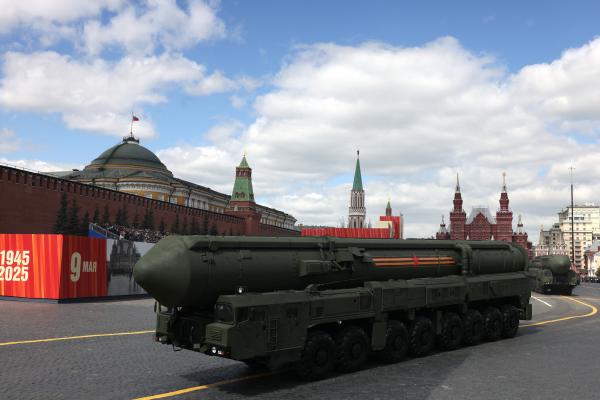
Join Assistant Secretary of State for Arms Control and Nonproliferation Dr. Christopher Yeaw for a discussion on strategic deterrence.



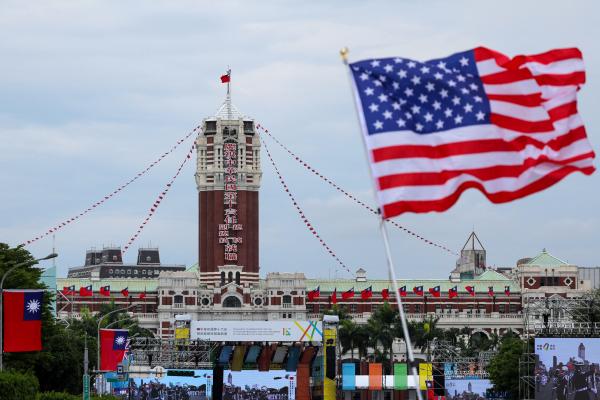
Join Hudson for an expert panel on why these deals are so important for both nations, what they mean for the future of US supply chains, and what potential challenges remain for implementing these deals.

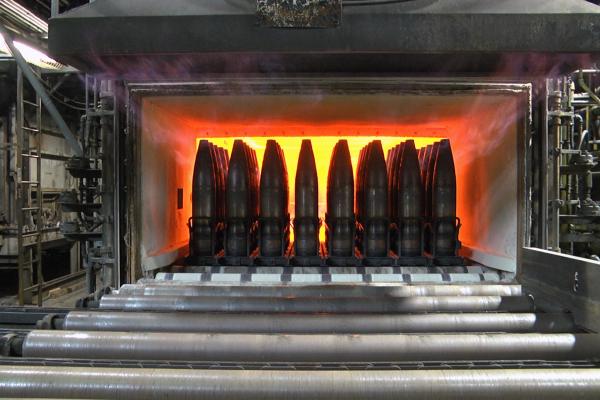
Join Hudson for a conversation with Assistant Secretary of War for Industrial Base Policy Michael Cadenazzi, who leads the DoW’s efforts to develop and maintain the US defense industrial base to secure critical national security supply chains.




